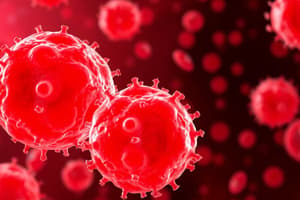Podcast
Questions and Answers
Which of these are types of granulocytes? (Select all that apply)
Which of these are types of granulocytes? (Select all that apply)
- Neutrophils (correct)
- Basophils (correct)
- Monocytes
- Eosinophils (correct)
- Lymphocytes
Which type of white blood cell disorder affects the quantity of cells?
Which type of white blood cell disorder affects the quantity of cells?
- Qualitative disorder
- Quantitative disorder (correct)
What is the name of the disorder characterized by the absence of neutrophils in peripheral circulation?
What is the name of the disorder characterized by the absence of neutrophils in peripheral circulation?
Agranulocytosis
Agranulocytosis is always caused by drugs or irradiation.
Agranulocytosis is always caused by drugs or irradiation.
What is the name of the disorder characterized by periodic decreases in circulating neutrophils, occurring every 3-4 weeks?
What is the name of the disorder characterized by periodic decreases in circulating neutrophils, occurring every 3-4 weeks?
Cyclic neutropenia is more common in adults than infants.
Cyclic neutropenia is more common in adults than infants.
What is the name of the disorder characterized by the presence of immature cells in the peripheral circulation and bone marrow?
What is the name of the disorder characterized by the presence of immature cells in the peripheral circulation and bone marrow?
Which of the following is NOT a factor that can contribute to the development of leukemia?
Which of the following is NOT a factor that can contribute to the development of leukemia?
Chronic leukemia is generally more severe and aggressive than acute leukemia.
Chronic leukemia is generally more severe and aggressive than acute leukemia.
What are the main problems associated with dental management in patients with acute leukemia? (Select all that apply)
What are the main problems associated with dental management in patients with acute leukemia? (Select all that apply)
It is generally safe to perform routine surgical procedures on patients with chronic leukemia.
It is generally safe to perform routine surgical procedures on patients with chronic leukemia.
What is the name of the type of cancer that originates in the lymph nodes and can affect any part of the body?
What is the name of the type of cancer that originates in the lymph nodes and can affect any part of the body?
Which type of lymphoma is associated with Reed-Sternberg cells?
Which type of lymphoma is associated with Reed-Sternberg cells?
Non-Hodgkin's lymphoma is generally more aggressive than Hodgkin's lymphoma.
Non-Hodgkin's lymphoma is generally more aggressive than Hodgkin's lymphoma.
What is the name of the type of oral lesion that is commonly seen in patients with Non-Hodgkin's lymphoma and is often associated with telangiectatic blood vessels?
What is the name of the type of oral lesion that is commonly seen in patients with Non-Hodgkin's lymphoma and is often associated with telangiectatic blood vessels?
What is the name of the disorder that is characterized by a disseminated plasma cell neoplasm in the bone marrow, producing abnormal monoclonal immunoglobulin?
What is the name of the disorder that is characterized by a disseminated plasma cell neoplasm in the bone marrow, producing abnormal monoclonal immunoglobulin?
The Bence-Jones protein is a specific marker for multiple myeloma.
The Bence-Jones protein is a specific marker for multiple myeloma.
What is the name of the condition where a patient presents with a high fever, chills, fatigue, and a sore throat? The infection also commonly affects the mouth, gastrointestinal tract, respiratory tract, and skin.
What is the name of the condition where a patient presents with a high fever, chills, fatigue, and a sore throat? The infection also commonly affects the mouth, gastrointestinal tract, respiratory tract, and skin.
What are the key features of oral ulcerations in agranulocytosis? (Select all that apply)
What are the key features of oral ulcerations in agranulocytosis? (Select all that apply)
Oral ulcerations in agranulocytosis are always accompanied by a prominent inflammatory halo around the margins of the ulcers.
Oral ulcerations in agranulocytosis are always accompanied by a prominent inflammatory halo around the margins of the ulcers.
What is a key finding in the complete blood count (CBC) of a patient with agranulocytosis?
What is a key finding in the complete blood count (CBC) of a patient with agranulocytosis?
Dental surgery can be safely performed on patients with agranulocytosis.
Dental surgery can be safely performed on patients with agranulocytosis.
What are the important aspects of managing a patient with agranulocytosis? (Select all that apply)
What are the important aspects of managing a patient with agranulocytosis? (Select all that apply)
What is the name of the infectious disease that is often referred to as the "kissing disease"?
What is the name of the infectious disease that is often referred to as the "kissing disease"?
What are the characteristic symptoms of infectious mononucleosis? (Select all that apply)
What are the characteristic symptoms of infectious mononucleosis? (Select all that apply)
The heterophil antibody test is used to diagnose infectious mononucleosis.
The heterophil antibody test is used to diagnose infectious mononucleosis.
What is the common treatment for infectious mononucleosis? (Select all that apply)
What is the common treatment for infectious mononucleosis? (Select all that apply)
What is the name of the malignant tumor that arises from plasma cells in the bone marrow?
What is the name of the malignant tumor that arises from plasma cells in the bone marrow?
Multiple myeloma primarily affects older adults.
Multiple myeloma primarily affects older adults.
What are the hallmark clinical features of Multiple myeloma? (Select all that apply)
What are the hallmark clinical features of Multiple myeloma? (Select all that apply)
The Bence-Jones protein is a specific marker for multiple myeloma and can be detected only in blood.
The Bence-Jones protein is a specific marker for multiple myeloma and can be detected only in blood.
What are the key diagnostic features of multiple myeloma? (Select all that apply)
What are the key diagnostic features of multiple myeloma? (Select all that apply)
Chemotherapy is the mainstay of treatment for multiple myeloma.
Chemotherapy is the mainstay of treatment for multiple myeloma.
Flashcards
Agranulocytosis
Agranulocytosis
Disorder characterized by an absence of neutrophils in the peripheral blood.
Idiopathic Agranulocytosis
Idiopathic Agranulocytosis
Causes of Agranulocytosis, which can occur without any identifiable reason.
Secondary Agranulocytosis
Secondary Agranulocytosis
Causes of Agranulocytosis triggered by external factors like medications or radiation.
Neutrophils
Neutrophils
Signup and view all the flashcards
Eosinophils
Eosinophils
Signup and view all the flashcards
Basophils
Basophils
Signup and view all the flashcards
Lymphocytes
Lymphocytes
Signup and view all the flashcards
Monocytes
Monocytes
Signup and view all the flashcards
Neutropenia
Neutropenia
Signup and view all the flashcards
Cyclic neutropenia
Cyclic neutropenia
Signup and view all the flashcards
Multiple Myeloma
Multiple Myeloma
Signup and view all the flashcards
Leukemia
Leukemia
Signup and view all the flashcards
Infectious mononucleosis
Infectious mononucleosis
Signup and view all the flashcards
Quantitative blood disorders
Quantitative blood disorders
Signup and view all the flashcards
Qualitative blood disorders
Qualitative blood disorders
Signup and view all the flashcards
Fever
Fever
Signup and view all the flashcards
Chills
Chills
Signup and view all the flashcards
Fatigue
Fatigue
Signup and view all the flashcards
Sore throat
Sore throat
Signup and view all the flashcards
Oral ulcerations
Oral ulcerations
Signup and view all the flashcards
Secondary fusospirochetal infection
Secondary fusospirochetal infection
Signup and view all the flashcards
Regional lymphadenopathy
Regional lymphadenopathy
Signup and view all the flashcards
Complete Blood Count (CBC)
Complete Blood Count (CBC)
Signup and view all the flashcards
Study Notes
Oral Medicine, Diagnosis & Periodontology I
- Students are responsible for all lecture and section material, even if not in handouts
- Textbook: Burket's Oral Medicine 12th edition
White Blood Cell Disorders
- White blood cells are categorized into granular and non-granular cells
- Granular cells include neutrophils (70%), eosinophils, and basophils
- Non-granular cells include lymphocytes (B & T) and monocytes
Quantitative Disorders
- Agranulocytosis: Absence of granulocytes
- Cyclic neutropenia: periodic decrease in circulating neutrophils
Qualitative Disorders
- Multiple myeloma
- Leukemia
- Infectious mononucleosis
Agranulocytosis
- Characterized by the near-total absence of granulocytes in the peripheral blood.
- A severe decrease in neutrophils.
Cyclic Neutropenia
- Characterized by periodic or cyclic decreases in the number of circulating neutrophils.
- Neutropenic episodes occur every 3-4 weeks and last for 3-5 days.
Infectious Mononucleosis (glandular fever)
- Etiology: Epstein-Barr virus (EBV)
- Spread by direct close oral contact
- EBV is found in saliva during and after infection
- Clinical features include fever, headache, malaise, sore throat with exudates, swollen lymph nodes, and splenomegaly
- Oropharyngeal features include sore throat with exudate in tonsils, petechiae at the junction of hard and soft palate, and pharyngeal edema affecting the airway.
- Laboratory tests include lymphocytosis (10%, atypical lymphocytes), heterophil antibodies (detected by Paul Bunnel test or Monospot test), and EBV antibodies.
- Management includes symptomatic treatment with bed rest, analgesics, antipyretics, and sometimes systemic corticosteroids for severe laryngeal edema, and antibiotics for infection.
Multiple Myeloma
- Etiology: Disseminated plasma cell neoplasm in the bone marrow that produces abnormal monoclonal immunoglobulins (mostly IgG, occasionally IgA).
- Clinical features include age (middle age and elderly), pain in jaw or teeth due to bone destruction, and increased susceptibility to infection.
- Laboratory features often include normochromic, normocytic anemia, neutropenia, and thrombocytopenia.
- Diagnosis includes history, clinical examination, protein electrophoresis (detecting monoclonal bands in serum and urine), bone marrow biopsy, and X-rays showing generalized osteoporosis or punched-out osteolytic lesions.
- Management includes chemotherapy.
Leukemia
- Definition: Neoplastic proliferation of white blood cells (WBCs) characterized by the presence of immature cells in the peripheral circulation and bone marrow.
- Classification: Based on the type of cells affected and the number of leukemic cells in circulation.
- Clinical features can include fever, night sweats, weight loss, bleeding easily, and pain in the bones.
- Oral manifestations include pallor of the oral mucosa/tongue coating, bleeding, infections and ulcers.
- Dental management includes receiving only palliative emergency dental treatment, and avoiding surgery unless in emergencies, where platelet count, bleeding time, APTT, PT should be considered prior to carrying out surgical procedures.
- Chemotherapy is one possible treatment for leukemia.
Lymphomas
-
Definition: Group of solid malignant tumors originating in lymph nodes, any part of the body.
-
Classification: Hodgkin's lymphoma and Non-Hodgkin's lymphoma (NHL).
-
Features specific to lymphomas differentiate the subtype of lymphoma and help with accurate diagnosis.
-
Hodgkin's lymphoma affects T cells; Non-Hodgkin's lymphoma affects B or T cells.
-
Dental management for chronic leukemia includes performing operative procedures with strict asepsis and atraumatically.
-
Using aspirin should be avoided.
Studying That Suits You
Use AI to generate personalized quizzes and flashcards to suit your learning preferences.




